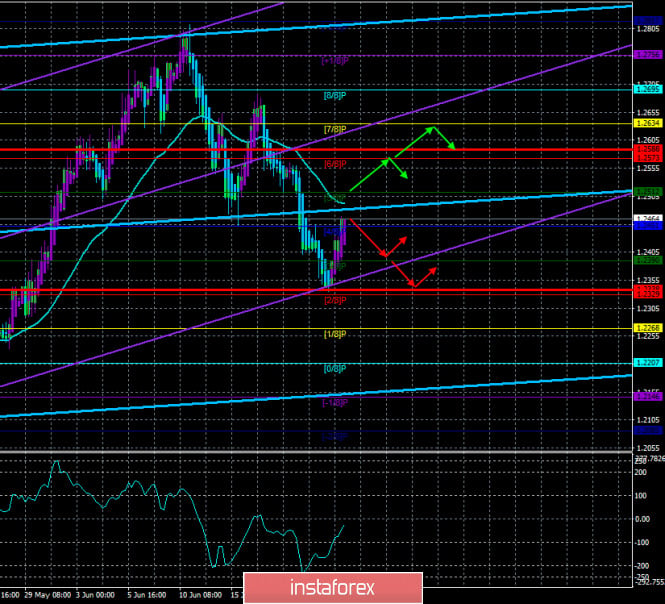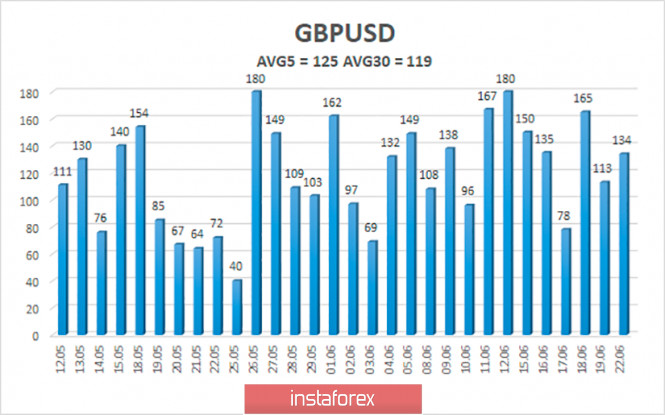4-hour timeframe

Technical details:
Higher linear regression channel: direction - upward.
Lower linear regression channel: direction - upward.
Moving average (20; smoothed) - downward.
CCI: -26.4393
The British pound also started to adjust against the US currency during the first trading day of the new week. In contrast to the euro, the previous downward movement was much stronger, so the pound/dollar pair needs to go a long distance to the moving average line. However, the overall volatility and strength of the pair's movement are higher than those of the euro/dollar. Thus, in the near future, the moving average can be worked out, and the future fate of the British currency for the next few days will be decided around it. On Monday, there were no important macroeconomic publications in either the United States or the UK. There were no important statements from high-ranking officials, and the main news package still flows from the White House, from the office of the US President. However, this time the information is very interesting in the context of the confrontation between China and the United States on the eve of the presidential elections in America.
In short, Donald Trump once again broke his word and continues to adhere to the principle of "my word, I want to give, I want to take back". The American President was reminded that he threatened to impose sanctions against Chinese officials and organizations responsible for the oppression of the Uyghur people in one of the districts of China. When asked directly why Trump has not yet imposed sanctions, he will answer: "We were in the middle of a big trade deal. And I made a big deal - potential purchases of $ 250 billion." We recall the words of John Bolton from his memoirs that Trump hopes that Xi Jinping will help him in the upcoming elections. Or had hoped earlier, when there was at least some logical reason for it. Hardly anyone believes now that Beijing will help Trump defeat Joe Biden, who has always treated China well and will seek to establish business and working relations with him. Thus, it is not the introduction of new sanctions against China, Donald Trump is pursuing quite different goals. Most likely, the American president does not want to just completely bury the chances of his re-election in November. Recall that China about a month ago considered the option of canceling the "first phase" of the trade deal, the agreement on which was reached in January. At any time before the election, China can refuse to purchase agricultural products in the United States. Thus, American farmers will again be put in a very difficult position, which is already not the most enviable thanks to the "coronavirus crisis". However, Beijing has every chance to strike a new blow to Trump's political ratings, angering part of his electorate. It is easy to guess that farmers are unlikely to vote for Trump, who has damaged relations with China. Thus, from our point of view, the US leader will behave very carefully with China in the coming months. Of course, the accusations and "injections" against Beijing are unlikely to disappear, however, the American leader is unlikely to move from words to deeds. Any escalation of the conflict in Beijing threatens retaliatory measures that can further aggravate the deplorable state of Trump's popularity. Because the confrontation is now more Trump-China and not the US-China.
At the same time, representatives of Donald Trump and White House officials are trying their best to refute the statements of former national security adviser John Bolton. For example, the head of the trade council, Peter Navarro, said that Donald Trump never asked Xi Jinping to help him get re-elected for a second term. "Whatever Bolton says about China, it's just stupid, because no American president has treated China more harshly than the current one," Navarro said. However, Mr. Navarro forgot about such a concept as "political pressure", which was already applied to Trump in the case of his impeachment, which was initiated after the "pressure" on Kiev. The US leader, according to Bolton himself, wanted to get the support of the Chinese leader in exchange for a more lenient trade agreement or, perhaps, some trade preferences and easing.
Well, in the UK at the same time, the population wants Boris Johnson to reduce his salary because of the "coronavirus" pandemic. The British believe that British politicians should reduce their wages in times of economic crisis, as did London mayor Sadiq Khan. These are the results of a social survey conducted recently. Unfortunately, no important news regarding Brexit negotiations with Brussels has been received in recent days. Thus, the fundamental background remains quite weak, to say the least.
On Tuesday, the UK is also scheduled to publish business activity indices in the services and manufacturing sectors. The first indicator is expected to grow from 29 to 39.5, and the second – from 40.7 to 45.0. Thus, like in the Eurozone and the US, business activity will continue to increase, the only question is, to what extent will it be able to reach in the current economic conditions? Recall that even before the "coronavirus crisis", business activity in the UK manufacturing sector was below the mark of 50.0. From May 2019. Thus, as we can see, the industrial sector was in a state of decline even without the COVID-2019 epidemic. This applies not only to the UK but also to the entire EU and the US. According to many experts, the world economy has long been heading for a recession, and the "coronavirus" only helped it begin and manifest itself in full. Thus, we are not at all sure that in 2020 business activity will grow above 50.0, which is in Britain, which is across the ocean.
The trend for the pound/dollar pair is still downward, so sell orders remain relevant. However, both channels of linear regression are directed upwards, so far the downward trend is only in the short term. If sellers manage to stay below the moving average, the downward movement is likely to continue. From our point of view, it is the further fall of the pound that will be most logical.

The average volatility of the pound/dollar pair continues to remain stable and is currently 125 points per day. For the pound/dollar pair, this indicator is "high". On Tuesday, June 23, thus, we expect movement within the channel, limited by the levels of 1.2338 and 1.2588. A reversal of the Heiken Ashi indicator downwards will indicate a possible resumption of the downward trend.
Nearest support levels:
S1 – 1.2390
S2 – 1.2329
S3 – 1.2268
Nearest resistance levels:
R1 – 1.2451
R2 – 1.2512
R3 – 1.2573
Trading recommendations:
The pound/dollar pair started to adjust on the 4-hour timeframe. Thus, today it is recommended to resume selling the pound/dollar pair with the goals of 1.2390 and 1.2329 if the Heiken Ashi indicator turns down or there is a rebound from the moving average. It is recommended to buy the pound/dollar pair not earlier than fixing quotes above the moving average with the first goals of 1.2573 and 1.2634.
The material has been provided by InstaForex Company - www.instaforex.com